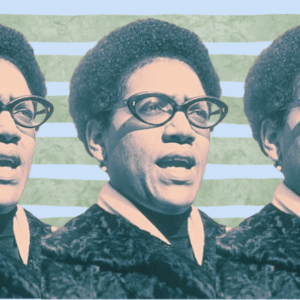As much as she’d been hoping otherwise, Rebeca Linke’s thirtieth birthday began with exactly what she had expected: nothing. What if nothing happens? she asked herself. I don’t care if it’s good or bad, so long as it’s something.
Her mistake had been to invest her hopes in a crucial event occurring at an arbitrary point in time when what needed to happen would inevitably be a flash in the dark, an unexpected ambush that catches you unawares during an otherwise ordinary situation.
But then the fateful day came. Just a dull summer yawn, as unremarkable as any other. Rebeca looked at it over her shoulder in the mirror. A beautiful day behind a beautiful face. Both lacking the qualities that make things memorable.
It all began with a subconscious withdrawal from her ordinary life, a disappearance. Perhaps the moment of revelation, when something truly unique happens in our lives, had finally come for her. If it occurs at a wake, this event consists of being full of life next to someone who will never move again. And if it marks the passing of yet another year, the kind involving a dangerously round number, it is the opportunity to finally decide what to do with the rest of your life.
The cottage at which Rebeca arrived at midnight seemed to be suspended in space. She hadn’t got to know it yet. All she knew was what was in plain sight: a large field stretching out in front of her, abruptly interrupted by the dark silhouette of a sea creature. Right from the start, she thought that the forest looked like a beached whale. On the windy day she first saw it, it had been possessed by a kind of madness, like certain kinds of repressed human anger. The forest moved without moving, exhaling noisy, portentous gusts of wind, rooted to the spot in twitchy bondage. Then it would be still for a time, its indomitable mass breathing quietly.
It all began with a subconscious withdrawal from her ordinary life, a disappearance. Perhaps the moment of revelation, when something truly unique happens in our lives, had finally come for her.
To the right, the leafy barrier didn’t quite reach the river. The river had no name, at least not one she knew, and ran along the forest, separated by a mysteriously clear strip of what was perhaps leaves or sand—something the color of her own personal void.
But there was more to the incredible landscape she had acquired upon buying the cottage for next to nothing. It was something less tangible, like the ability to escape at any moment by train. This is what had happened the night before when, watched in amazement by her fellow passengers, she had stepped off the train into the solitary locale: a stop in the middle of a field before the next station. She had been told it was a special privilege granted to the owner of the cottage. Well, if there was a reason for this odd addendum to her property rights, at that moment she wasn’t interested in what it could be. She simply cut across the field lit by a complicit moon and slipped into the house, completely shorn of any ties to the past, feeling like she were entering a primitive womb from which she would only return once supremely well prepared.
Rebeca Linke let the coat covering her nudity fall to the floor. She lay on the bed and observed the moonlight filtering through the shutters; the black-and-white stripes made everything uniform. Several times she tried to close her eyes and slip between the bars, but they were waiting for her behind her eyelids. She became lost in a hypnotic dream. A dream that carried her back along the same rails as those used by the train that had stopped for her alone. Again she heard the insistent voice that had been badgering her since the beginning of her trip: “Excuse me, madam, can I see your ticket?” The man’s heavy voice founders among the long, solid rows of seats. Trees line the road; another train passes in the opposite direction. After a long flight through the night, the stations come. People get on and off, stealing each other’s places. “Haven’t you found it yet?” The man’s voice upon her again. But she’ll never find it. Then come the fences: taut, stretched wires, a monotonous hum. She tries to remember the title of the book on her nightstand and has to stammer, interrupted by the voice, which no longer comes from the man but the fences. “Allow me to look for it myself, madam. The ticket must be in your pocket, maybe next to your keys.” This time the words sounded remote; the man had uttered them from among the far-off, trembling wires, as if through water, tangled in the violin strings vibrating in the static beyond life. “Oh, thank you,” she said sweetly. “One always forgets the little things.” Always forgets. Always forgets. Monotonous hum. The man’s fingers wanted to take the music away from her. The key, the ticket, the fences. They pass over an iron bridge. The sound echoes in the chasm below. Someone cast into the void calls out sadly, “Madam, I don’t want to interrupt your journey . . . but when someone sees trouble coming they should let others know . . . offer fair warning . . .” The last thing the little man will ever say. She would have liked to go back and jump out to find him. But the black-and-white stripes took her somewhere else, leaving her exhausted. “One always forgets the little things” was the last thing she could remember. “Always forgets.” And yet, before passing out, she managed to remember other details. For example, inside the book on the nightstand there was a small dagger, a work of art, just right for beheading a woman imprisoned in irritating parallel bars like these. They were keeping her from finding herself.
The grasping hand won’t make it. It knocks a glass of water off the table and sits there like a frozen flower. But then the dagger shows that it can reach her on its own. It moves, attracted to her fingertips and, of course, to her hand, which is attached to an arm, which in turn belongs to a body with a head and a neck. A head, such an important part of the body on top of something as fragile as a neck.
Although the arm was limp and the hand fingerless, the blade penetrated easily. It came across countless things that might have been called arteries, veins, cartilage, or warm, viscous blood, everything except for pain. By then, pain no longer existed.
The grasping hand won’t make it. It knocks a glass of water off the table and sits there like a frozen flower. But then the dagger shows that it can reach her on its own. It moves, attracted to her fingertips
The head rolled heavily, like a fruit. Rebeca Linke watched it fall impassively, feeling neither joy nor sorrow.
This marked the beginning of a new state of being, no more than a black strip, frozen definitively in time. Was it possible that the moving world had been resolved just like that, with a single thrust? The headless woman lay on the dark carpet, stretched out nightmarishly in her final act. There could be, there very well may be, a dimension in time for such things, but it offered little room for conjecture. Once the throat had been severed, all questions came to an end.
*
Anyone who has ever lost a limb knows that on occasion, for a few brief titillating seconds, you feel as though it has returned. The sensation is very convincing. This is how she felt, still precariously placed in her memoryless strip. Or maybe her head, the one she didn’t have, was sprouting again, easily, naturally, like a kind of poppy seed. She felt a slight buzzing inside of her, just a pregnant glimmer, but it was the only sign of life that she could have possibly hoped for.
After an incalculable period of time, deep, elemental impulses began to reappear. One foot twitched, then the whole body jerked upright, and just like that the black strip was tamed and the first stage was over. Now she was able to find her erstwhile head and take it in her hands. She rocked it gently as she walked, testing the weight of her burden. She was still unable to move in a set direction or keep her balance. An inner growth, like the first swelling of milk, was taking possession of her. But that wasn’t all. In her deepest, most intimate core, an awareness of guilt started to manifest itself. She had spilled this sadness onto the earth; this head without a pedestal was her doing.
The woman could not yet do anything but the simplest acts, but she tried and succeeded in performing a series of movements. She picked up a handkerchief and placed it with her free hand under the head, fastening it at the bottom. This was more than necessary: blood was falling from the circular wound like rain.
Then the savage little statue shimmered back into reality and the true nature of her crime was revealed. But Rebeca Linke would never again try to balance out the two contradictory halves of herself. The only evidence of the poppy seed inside her was a muffled vegetable rattle, like hail hitting a windowpane. Although she was incapable of stringing together complex thoughts, she must have realized that this placid state could no longer be sustained. She was beholden to the present, like water held in the palm of a hand. Quickly placing the head on top of something, she stepped back to observe the effect in the darkness. The amputated body part continued to mutate, now adopting a stubborn disposition. Seen from a new perspective, the woman decided that she liked this version better than the little effigy of the peasant woman, with its round, protruding tongue. Fierce and angry from her chin to her eyebrows, temples, and hair, she regarded the incredible metamorphosis of the bodiless doll as a challenge. A strange, equivocal feeling came over her. She knelt down until she was at the same level as the head. “Amanda, I want to kiss you,” she murmured. But she was unable to consummate the act. As in a nightmare, the unreality of her mouth made it impossible.
Suddenly, she saw in horror that the head was still bleeding, the gaunt, pale face hankering for its blood. It was now paramount that she restore the natural order of things. She had to bring her thoughts back to the top and reconstruct the real universe with its stars above and ground below. She had to rewrite the primordial plan. In one graceful movement, the decapitated woman picked up her old head and shoved it on like a helmet. The unfamiliar weight made her sway for a moment. It was difficult, annoying, to have to look at the world through eyes. She was trapped in an attic where things and their images scratched pitilessly at the innocent air, clamoring for their rightful places. Fortunately, the two flows of sap combined easily, far more quickly than would ordinarily happen in a grafted plant.
All fixed? The woman ran her thumbs around her neck, where the wound had started to burn like a red-hot wire, but this was nothing compared to the urgency of her new vigil. She stumbled around, surveying the room. In fact, the anemic head seemed changed, quite different. But what did that matter? A subtle feeling of happiness was distorting her ability to make the comparison. Finally, her hand, which was being unusually slow, managed to get the door open. It had struggled with the handle for an age.
__________________________________
From The Naked Woman. Used with permission of the Feminist Press. Copyright © 2018 by Armonía Somers. English translation copyright © 2018 by Kit Maude.













